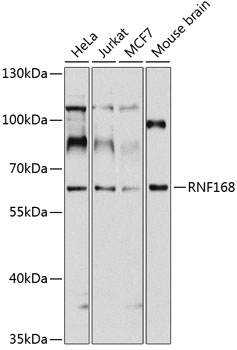Epigenetics & Nuclear Signaling Antibodies 3
Anti-RNF168 Antibody (CAB3556)
- SKU:
- CAB3556
- Product Type:
- Antibody
- Reactivity:
- Human
- Reactivity:
- Mouse
- Host Species:
- Rabbit
- Isotype:
- IgG
- Research Area:
- Epigenetics and Nuclear Signaling
Description
| Antibody Name: | Anti-RNF168 Antibody |
| Antibody SKU: | CAB3556 |
| Antibody Size: | 20uL, 50uL, 100uL |
| Application: | WB |
| Reactivity: | Human, Mouse |
| Host Species: | Rabbit |
| Immunogen: | Recombinant fusion protein containing a sequence corresponding to amino acids 300-571 of human RNF168 (NP_689830.2). |
| Application: | WB |
| Recommended Dilution: | WB 1:1000 - 1:2000 |
| Reactivity: | Human, Mouse |
| Positive Samples: | HeLa, Jurkat, MCF7, Mouse brain |
| Immunogen: | Recombinant fusion protein containing a sequence corresponding to amino acids 300-571 of human RNF168 (NP_689830.2). |
| Purification Method: | Affinity purification |
| Storage Buffer: | Store at -20'C. Avoid freeze / thaw cycles. Buffer: PBS with 0.02% sodium azide, 50% glycerol, pH7.3. |
| Isotype: | IgG |
| Sequence: | WLCA CGAE WYHE GNVK TRPS NHGK ELCV LSHE RPKT RVPY SKET AVMP CGRT ESGC APTS GVTQ TNGN NTGE TENE ESCL LISK EISK RKNQ ESSF EAVK DPCF SAKR RKVS PESS PDQE ETEI NFTQ KLID LEHL LFER HKQE EQDR LLAL QLQK EVDK EQMV PNRQ KGSP DEYH LRAT SSPP DKVL NGQR KNPK DGNF KRQT HTKH PTPE RGSR DKNR QVSL KMQL KQSV NRRK MPNS TRDH CKVS KSAH SLQP SISQ KSVF QMFQ RCTK |
| Gene ID: | 165918 |
| Uniprot: | Q8IYW5 |
| Cellular Location: | Nucleus |
| Calculated MW: | 65kDa |
| Observed MW: | 65kDa |
| Synonyms: | RNF168, hRNF168 |
| Background: | This gene encodes an E3 ubiquitin ligase protein that contains a RING finger, a motif present in a variety of functionally distinct proteins and known to be involved in protein-DNA and protein-protein interactions. The protein is involved in DNA double-strand break (DSB) repair. Mutations in this gene result in Riddle syndrome. |
| UniProt Protein Function: | RNF168: E3 ubiquitin-protein ligase required for accumulation of repair proteins to sites of DNA damage. Acts with UBE2N/UBC13 to amplify the RNF8-dependent histone ubiquitination. Recruited to sites of DNA damage at double-strand breaks (DSBs) by binding to ubiquitinated histone H2A and H2AX and amplifies the RNF8- dependent H2A ubiquitination, promoting the formation of 'Lys-63'- linked ubiquitin conjugates. This leads to concentrate ubiquitinated histones H2A and H2AX at DNA lesions to the threshold required for recruitment of TP53BP1 and BRCA1. Also recruited at DNA interstrand cross-links (ICLs) sites and promotes accumulation of 'Lys-63'-linked ubiquitination of histones H2A and H2AX, leading to recruitment of FAAP20/C1orf86 and Fanconi anemia (FA) complex, followed by interstrand cross-link repair. H2A ubiquitination also mediates the ATM-dependent transcriptional silencing at regions flanking DSBs in cis, a mechanism to avoid collision between transcription and repair intermediates. Also involved in class switch recombination in immune system, via its role in regulation of DSBs repair. Following DNA damage, promotes the ubiquitination and degradation of JMJD2A/KDM4A in collaboration with RNF8, leading to unmask H4K20me2 mark and promote the recruitment of TP53BP1 at DNA damage sites. Not able to initiate 'Lys-63'-linked ubiquitination in vitro; possibly due to partial occlusion of the UBE2N/UBC13-binding region. Catalyzes monoubiquitination of 'Lys-13' and 'Lys-15' of nucleosomal histone H2A (H2AK13Ub and H2AK15Ub, respectively). Defects in RNF168 are the cause of Riddle syndrome (RIDDLES). Riddle syndrome is characterized by increased radiosensitivity, immunodeficiency, mild motor control and learning difficulties, facial dysmorphism, and short stature. Defects are probably due to impaired localization of TP53BP1 and BRCA1 at DNA lesions. Belongs to the RNF168 family. |
| UniProt Protein Details: | Protein type:Ubiquitin ligase; EC 6.3.2.-; Ubiquitin conjugating system Chromosomal Location of Human Ortholog: 3q29 Cellular Component: cytoplasm; nucleoplasm; nucleus; protein complex; ubiquitin ligase complex Molecular Function:chromatin binding; histone binding; nucleosome binding; protein binding; ubiquitin binding; ubiquitin-protein ligase activity Biological Process: double-strand break repair; double-strand break repair via nonhomologous end joining; isotype switching; positive regulation of DNA repair; protein sumoylation; protein ubiquitination; response to DNA damage stimulus; response to ionizing radiation; ubiquitin-dependent protein catabolic process Disease: Riddle Syndrome |
| NCBI Summary: | This gene encodes an E3 ubiquitin ligase protein that contains a RING finger, a motif present in a variety of functionally distinct proteins and known to be involved in protein-DNA and protein-protein interactions. The protein is involved in DNA double-strand break (DSB) repair. Mutations in this gene result in Riddle syndrome. [provided by RefSeq, Sep 2011] |
| UniProt Code: | Q8IYW5 |
| NCBI GenInfo Identifier: | 74762499 |
| NCBI Gene ID: | 165918 |
| NCBI Accession: | Q8IYW5.1 |
| UniProt Secondary Accession: | Q8IYW5,Q8NA67, Q96NS4, |
| UniProt Related Accession: | Q8IYW5 |
| Molecular Weight: | 65,020 Da |
| NCBI Full Name: | E3 ubiquitin-protein ligase RNF168 |
| NCBI Synonym Full Names: | ring finger protein 168 |
| NCBI Official Symbol: | RNF168 |
| NCBI Official Synonym Symbols: | hRNF168 |
| NCBI Protein Information: | E3 ubiquitin-protein ligase RNF168 |
| UniProt Protein Name: | E3 ubiquitin-protein ligase RNF168 |
| UniProt Synonym Protein Names: | RING finger protein 168 |
| Protein Family: | E3 ubiquitin-protein ligase |
| UniProt Gene Name: | RNF168 |
| UniProt Entry Name: | RN168_HUMAN |
View AllClose







